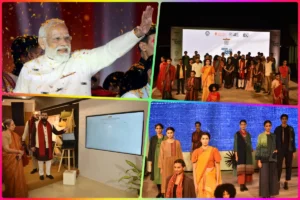
Discover the significance of Diwali, its history, and some lesser-known details about the Festival of Lights.
Diwali 2023: November 12 is the day of the fortunate Hindu festival of Diwali. Celebrated with great fanfare all throughout the nation, the Festival of Lights is also known as Deepavali. It represents the “victory of light over darkness, good over evil, and knowledge over ignorance” on a spiritual level. The event is observed on the 15th day of Kartik month, which is the darkest night of the year, and comes between mid-October and mid-November in accordance with the lunisolar Hindu calendar. Dhanteras is the first of five days of celebrations, which conclude with Bhai Dooj. As we prepare to celebrate the event, learn about its significance, history, and some lesser-known facts.
Why is Diwali celebrated?
After 14 years of banishment and his victory over Ravana, the King of Lanka, Lord Rama returns to Ayodhya on Diwali along with Maa Sita and Lord Lakshman. Hindus rejoice on Diwali for a variety of causes. Celebrated nationwide, the event honors the nation’s rich cultural legacy. The holiday is a unifying celebration, observed even by Indians living abroad. Additionally, family gather together around this time of year. Diwali also commemorates the triumph of light over darkness and good over evil. People worship deities like Goddess Lakshmi and Lord Ganesha at this period, which helps them become spiritually awakened and immerse themselves in traditions.
Also Read : iPhone 11 to 12 13 14 15 become cheaper, discount on flipkart
In the meantime, Hindus also consider Deepavali to be a lucky and prosperous time of year. As a result, it symbolizes new beginnings for them as they begin their financial year and new endeavors. As people decorate their homes with diyas, candles, and colorful lights, indulge in delectable treats, exchange gifts, observe customs passed down through the centuries, participate in Lakshmi Puja, and give to charity, it also strengthens a sense of community.
The importance and history of Diwali 2023:
Legend has it that on the auspicious day of Diwali, Lord Rama, the Prince of Ayodhya, came home (Ayodhya) from vanvas (exile) after 14 years and conquered Ravana, the King of Lanka, accompanied by Mata Sita and Lakshman. In celebration of his return, the people of Ayodhya lit rows of lamps and diyas along the city’s streets and in each and every residence. The Festival of Lights is a celebration of this ongoing tradition.
Diwali represents the triumph of knowledge over ignorance, light over darkness, and good over evil. It symbolizes the removal of doubt, pessimism, and gloomy shadows from our existence. The festival spreads the idea that clarity and positivity can illuminate our inner selves. People exchange gifts with loved ones, give to charities, and pray to Goddess Lakshmi and Lord Ganesh on this day of celebration and adoration for prosperity.
Also Read : Lotus Eletre launched in India
Lesser-known facts about Diwali 2023:
These are some details regarding the Festival of Lights that you may not be aware of:
1) Diwali falls on a night without the moon – As per the Hindu calendar, Diwali is celebrated on Amavasya (moonless night) in the month of Kartik.
2) Diwali marked the laying of the Golden Temple’s foundation.
3) The celebration is known by various titles both inside and outside of the nation. It is known as Tihar ir Swanti in Nepal. It is known as Hari Diwali in Malaysia. People celebrate Diwali as Lam Kriyongh in Thailand, where lamps are lit on bana leaves.
4) The biggest Diwali festivities take place in Leicester, United Kingdom, besides India. Tens of thousands of people congregate in the streets annually to take part in a night of dancing, music, and light displays.
5) On Diwali, people in Bengal revere Maa Kali, the remover of all evil forces. People in Nepal honor Lord Krishna and rejoice at his conquest of the evil monarch Narakasura.
To read more such news, download Bharat Express news apps





















